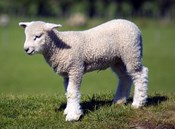The mutated gene, named callipyge, was found in a flock of sheep in Oklahoma in the early 1980’s. Some of these sheep had large muscling in their loins and legs. Research revealed that the only sheep with the abnormal muscling were those which had inherited a normal copy of a specific gene from their mother, but a mutated copy of the same gene from their father. This inheritance pattern is termed “paternal polar over-dominance,” and the case of the Oklahoma sheep was the first known example of this condition in mammals.
Duke University cancer researchers believe the discovery of this mutated gene may help them in their research. The Duke group has been working on identifying “imprinted genes”—that work differently than normal genes because the expression of the gene’s product depends on which parent the gene copy was inherited from. The Duke group is interested in “imprinting” as it relates to human cancer.
Duke cancer researcher Randy Jirtle also wants to find out how genes in this region of the sheep genome might be reflected in humans. The approach of aligning the sheep sequence of this specific region to the human genome to possibly identify a previously unknown human gene could aid efforts in other imprinted regions of importance to human medicine.
According to ARS geneticist Brad Freking of the Roman L. Hruskas U.S. Meat Animal Research Center (MARC) in Clay Center, Neb., this research shows the value of obtaining genomic sequences of more agricultural species to align with the human genome in the search for novel genes. Alignment of genomic sequences from several species could help identify important genetic regions not previously recognized in the human genome. This is especially true for regions containing mutations in livestock that have a major impact on the animal, such as the callipyge mutation discovered at MARC.
Source: David Elstein, Agriculture Research Service




